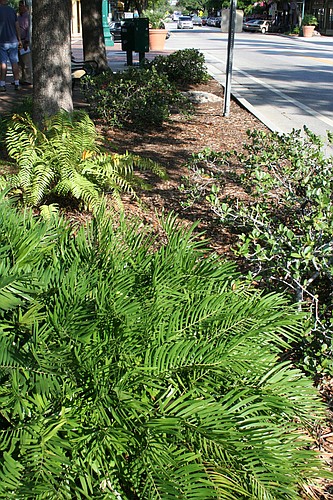- November 24, 2024
-
-
Loading

Loading

Members from the Greenspace Policy Committee appear to have rejected the idea of an “eye for an eye” when a business owner wants to cover a plant bed to expand his business — suggesting a shift in the winds for Sarasota's anti-business reputation.
“We have people coming here to do business, and we want to make them pay,” says Diana Hamilton. “That's not fair.”
The city's Neighborhood and Development Services Director Tim Litchet created the committee to help clear up confusion and quell frustration over the city's greenspace policy.
That policy has been the subject of heated debate since the new Main Street restaurant, Braza, twice had its application for outdoor dining space rejected.
It wanted to place pavers on 110 square feet of a sparse plant bed. The city said the restaurant could not create that dining area unless the restaurant created 110 square feet of greenspace somewhere else.
Litchet has since said that the city would pay for the addition of that greenspace in this case, but the debate began over mitigating lost greenspace square-foot-for-square-foot, or “netting.”
“To act as if (allowing outdoor dining space) is a gift from the city is backward,” says Denise Kowal, a Burns Square property owner. “We should be thanking (these businesses). Outdoor tables draw people. Shrubs don't.”
Committee member Andrew Foley says he believes netting is a bad policy because it assumes that two goals of the city and its residents — attractive streetscaping and lush landscaping — are in conflict with each other.
“I don't think that's true,” says Foley.
Carol Reynolds, downtown resident and member of Save Our Sarasota, says the City Commission has dictated that more downtown greenspace needs to be created.
“Everything I've heard from commissioners is that they want to increase greenspace,” she says. “The commission sounded in favor of netting.”
Reynolds was in the minority on the subject of netting.
Kowal says the space in front of her building used to be barren, but she paid for all the plants and trees that now adorn it. “What do I get from the city for paying for that myself?” she asks.
Foley says the assumption that businesses owners would leave everything lifeless and barren is misguided.
“All evidence I see is to the contrary,” he says. “Business owners put in landscaping to beautify their businesses. But if we create this penalizing system, we're going to discourage that.”
In a city that has a reputation for being business unfriendly, such a conversation is like fresh air to many. Perhaps there will be more Gulf Coast communities seeing a changing attitude at the bottom of the recession.
— Robin Roy, contributor